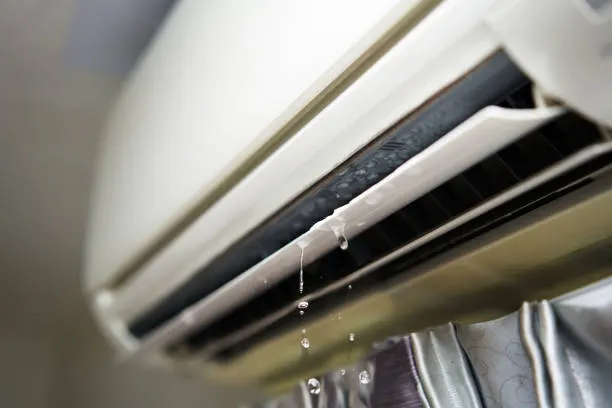1. Drain line clog or disconnection:
One of the biggest reasons for water leaks is a clogged or disconnected drain line. Condensation drain lines can become clogged with dust, debris, and algae over time. This barrier pushes the water to find alternative pathways, often resulting in leaks. Clogs can be avoided with routine maintenance, such as flushing the drain line with water and vinegar.
2. Dirty or frozen evaporator coil:
Water leakage can occur if the evaporator coil, which removes heat from the indoor air, becomes unclean or frozen. The dirt and particles on the coil’s surface prevent efficient heat transfer. Because of this, the coil gets too chilly and eventually freezes over. When the ice melts, it might cause an overflow in the drainage system. This problem can be avoided by keeping the evaporator coil clean and maintaining adequate airflow.
3. Damaged or improperly installed drain pan:
The drain pan’s primary function is to collect condensation and channel it to the plumbing’s waste line. Water may leak inside your house if the drain pan is broken or not installed properly. Drain pan cracks or misalignment can be caught early on with routine inspections. An additional drain pan may be necessary to prevent leaks in specific circumstances.
4. Low refrigerant levels:
Low quantities of refrigerant can cause the evaporator coil to fail to absorb enough heat, which in turn can cause condensation to form in excess. The drainage system may fail if too much water accumulates. Consult a competent HVAC technician immediately if you suspect low refrigerant levels. They will be able to locate the leak or other cause of refrigerant loss, refill the system, and fix any problems they find.
5. AC unit is too small:
Water leaking can be caused by an air conditioner that is either too big for the room it is supposed to cool or too tiny. Large units may cool the surroundings too rapidly, resulting in insufficient dehumidification and excess water condensation. Conversely, if the unit is too small for the cooling demand, the evaporator coil could freeze. Ensuring that your AC unit is properly sized for your room will prevent these concerns and promote effective functioning.
6. Air leakage around AC unit:
If there are holes or cracks around the air conditioner, warm, humid air from the outside can seep inside. Condensation and water leakage are both much worse when humid air comes into touch with the cold parts of the air conditioner. A controlled atmosphere and less chance of water leaks can be maintained by closing any holes surrounding the device and using proper insulation.
7. Blockage of condensate pump:
Blocking the condensate pump or placing it in an inconvenient location are two common problems with heating, ventilation, and air conditioning (HVAC) systems, especially those located in basements or other low-lying places. A failure to successfully evacuate the condensed water might occur if the pump is obstructed by debris or placed in an improper location. This can lead to overflow and subsequent leakage. This problem can be avoided by routinely inspecting the condensate pump, removing any obstructions, and placing it in the appropriate location.
8. Faulty ductwork:
Water leaks from your air conditioner might be caused by leaking or inadequately insulated ductwork. Condensation can form in ducts when cold air moves through them when the surrounding air is humid. This condensation can leak into your home if the ducts have holes or aren’t well insulated. Maintaining the effectiveness of your air conditioning system and avoiding water-related issues can be accomplished by examining the ductwork regularly and fixing any leaks found.
9. High humidity levels:
When the humidity level in your home is too high, water leaks can become even more of a problem. Air conditioners not only reduce the temperature in a room but also the humidity. Water leakage may occur if the humidity is too high and the system is unable to handle it. You may reduce the humidity in your home by using a dehumidifier and making sure there is adequate ventilation.
Water leak effects:
It’s important to pinpoint the root causes of water leaks from air conditioners before investigating the risks. A clogged drain line, filthy air filters, a broken condensate pump, or sloppy installation are common causes. Finding and fixing the problem’s origin is crucial for stopping it in the first place.
- Growth of mold and mildew: Mold and mildew growth is a major health risk related to water leaks. These hazardous germs thrive in damp conditions, such as those caused by water leaks. Health hazards, especially for those with respiratory disorders, are associated with mold and mildew growth in the home.
- Broken structures: The home’s structure could be weakened by the constant seepage of water. Water damage occurs when water seeps into a structure and weakens or destroys the foundation, walls, ceilings, or flooring. This can lead to expensive maintenance and structural instability over time.
- Dangerous currents: Water and electricity are a hazardous mix. Leaks in an air conditioner increase the possibility of electrical problems and short circuits because water can get into the unit’s electrical components. If this isn’t fixed soon, it poses a serious risk to people’s safety and could cause electrical fires.
- Failure of an appliance: Water leaks can potentially damage the performance of the air conditioner itself. The compressor, the fan motor, and the electronics are all vulnerable to water damage. This can lead to high energy bills and lengthy maintenance or possibly the complete failure of the unit, requiring a costly replacement.
Higher energy bills: A leaking air conditioner may not cool as well, resulting in higher energy bills. When the integrity of the system is damaged, it must work harder to maintain the set temperature, which in turn increases the cost of operation. Fixing a water leak as soon as possible not only eliminates costly repairs but also restores the appliance to peak efficiency.


